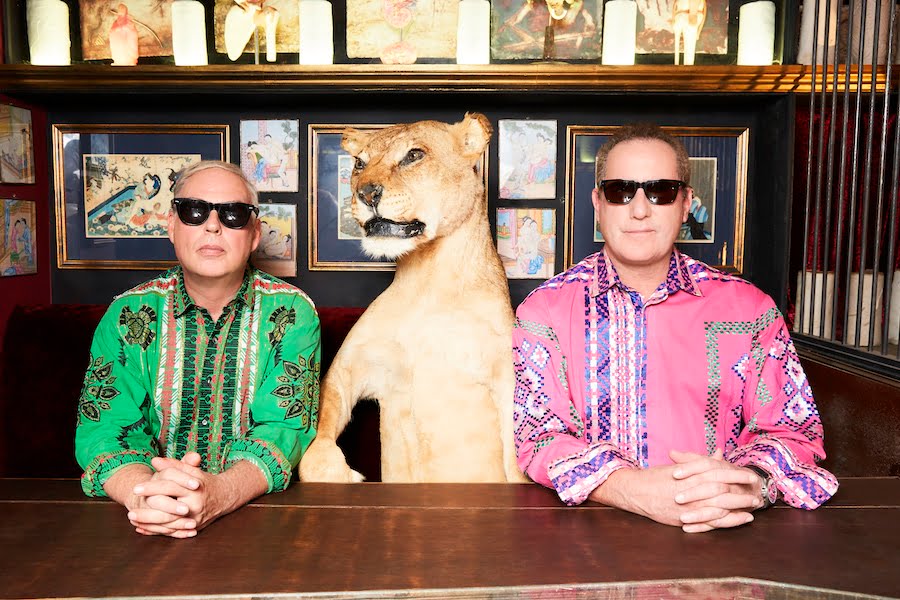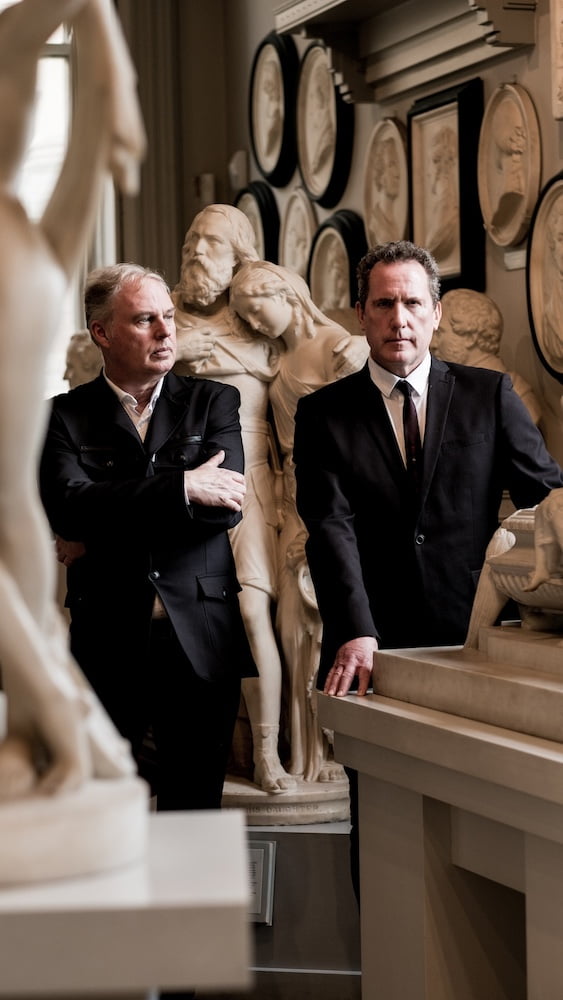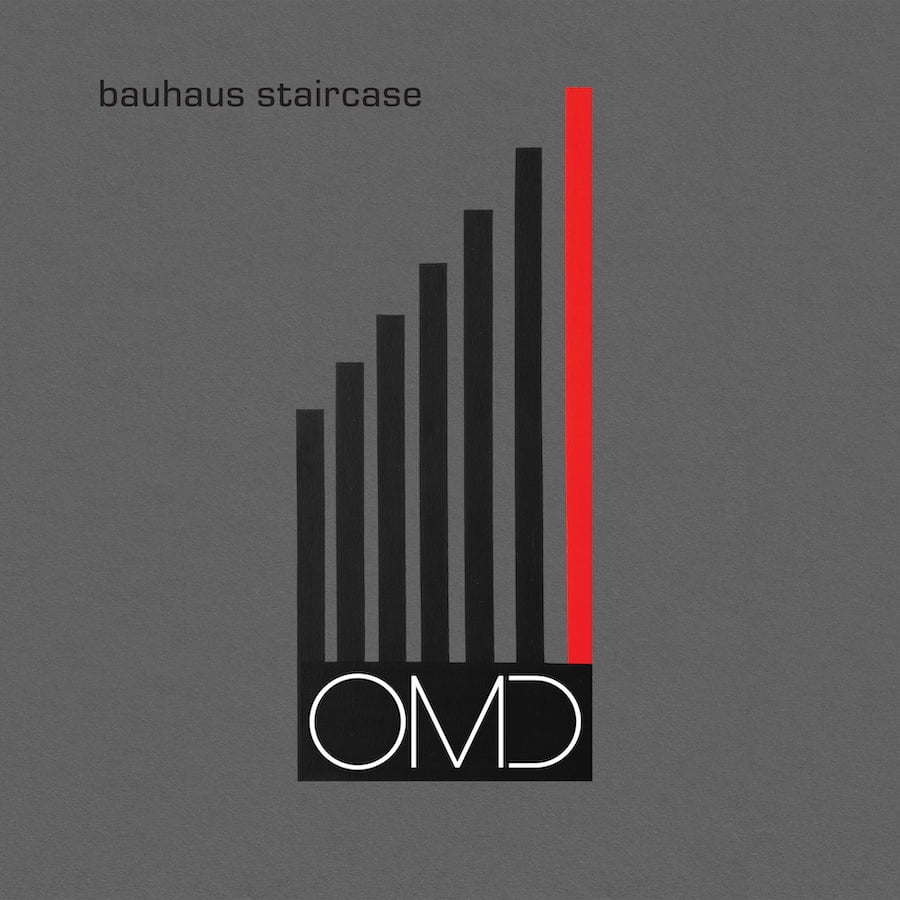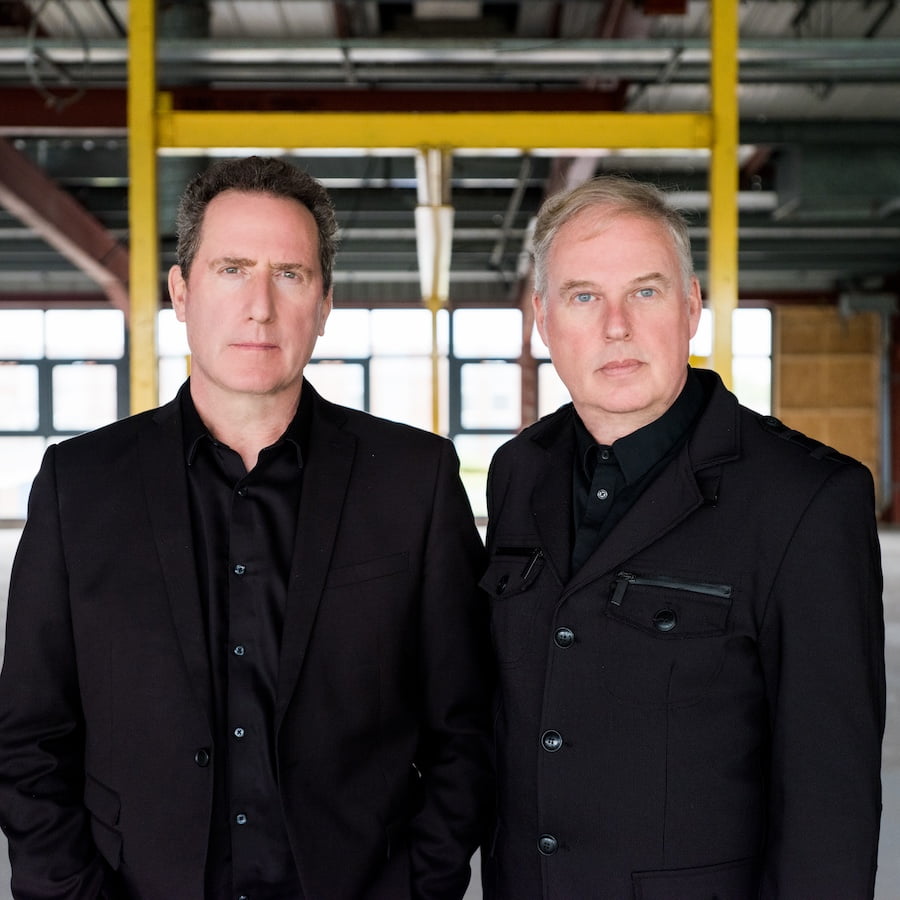
We only started this band because nobody else wanted to play with us.” Andy McCluskey’s reminder of how the essentially insular world of Orchestral Manoeuvres In The Dark began serves notice that, even by the standards of synth duos, McCluskey and Paul Humphreys are an unusual pair.
Of course, in Britain at least, OMD invented the synth duo template the moment they began playing their first shows at Eric’s in Liverpool in 1978, initially as a side-project from prog six-piece The Id.
The pair have much in common, aesthetically as much as musically: they’re interviewed separately, but both choose to greet Classic Pop from their respective home studios.
Not just because it makes for a good Zoom backdrop, but because they both enjoy showing the workings of fabulous new album Bauhaus Staircase. (Andy: “If Bauhaus name their next album OMD Carpet, I’d be very flattered.”)
Paul occasionally plays riffs on his keyboard that inspired new songs, while Andy reaches over for the ring-binder containing handwritten A4 notes and lyrics: “Much as I love the digital age, I find it easier to have paper that I can move around from page to page, rather than something locked on the digital screen.”
They share an easy sense of humour, too, a natural warmth that’s surely been heightened by knowing that OMD might never have had it so good.
Not only is their music back to the forward-thinking and infectious standards of Architecture & Morality and Dazzle Ships, but they no longer have a record company demanding that they make another album that good again by the end of the week, or else…
It’s how their humour comes across that highlights the duo’s essential differences. If he hadn’t been half of one of our most inventive synth-pop groups, Andy McCluskey could easily have become an observational stand-up. You can see something of Lee Mack in his knockabout, brash charm.
Paul Humphreys? Probably everyone’s favourite lecturer: he doesn’t have his bandmate’s ‘Here’s one…’ approach to comedy, but his gentle, quietly delivered wit is just as infectious. It’d be too easy to say that’s how OMD’s approach to songwriting works, too.
Even so, they’re different in their beliefs on how their songs should sound: the pair’s nicknames for each other are ‘The Butcher’ and ‘The Surgeon’, and it’s not hard to work out which one’s which.
“The only time Paul and I ever argue is over the final mixing of songs,” smiles McCluskey. “My way of mixing is to try to ensure everything is as loud as everything else. I keep pushing faders until I’ve lost control. Paul is much more patient and fastidious.”
Humphreys agrees, noting: “Andy pulls one way, I pull the other. Where we meet in the middle – that’s the OMD sound. I always go for the more purist, Kraftwerk sound, something that’s very detailed, clear and clean.
“Andy wants to get a bit of dirt in. I think he wants too much dirt in our sound, so I bring him back towards the centre. We always find a compromise.”

OMD Bauhaus Staircase
Andy summarises: “I go for what I think is more energy in the mixes. Paul will say: ‘It sounds perfect!’ and I have to tell him: ‘No, it sounds too perfect!’ We get the balance right eventually – even if I’m convinced he sometimes goes back and takes out some of the dirt after we’ve agreed.”
Quite simply, Paul is more laidback. “I’m definitely the more Type A person,” accepts McCluskey. “Paul is a very talented, creative man, but he’s quite happy to go: ‘I’ve got this idea, what do you think?’ I’ll tell him my plan: ‘I’m going to do this and that with it, twist and turn it into this!’ and Paul will say: ‘OK, sure – off you go.’”
That approach was doubly necessary on Bauhaus Staircase. It’s an album they hadn’t planned to make: the reception to 2013’s English Electric and its successor The Punishment Of Luxury four years later was so ecstatic that neither musician wanted to risk spoiling the run with a dud. What would be the gain?
Inevitably, song ideas nonetheless began to arrive. You’ll know Don’t Go, the shivering ballad initially released for 40th anniversary compilation Souvenir in 2019. A whole album, though? What a faff. And then lockdown arrived.
LEGACY STATEMENT
With no shows – or anything else – to keep them occupied, there was time for Andy to write all the songs to go alongside the great titles he’d had filed away, and for Paul to go through all the half-finished ideas on his laptop.
“We’d made an extra effort with The Punishment Of Luxury, because we thought it might well be our final album,” remembers Humphreys. “We had to make that record as good as it can be, in case it was our last statement. And I think it worked – OMD’s fans talk about it as being in our best three albums.
“That was job done. So to then make another album? Well, it had to be as good as or even better than The Punishment Of Luxury. Why ruin that legacy of our last statement’? So we’ve had to work just as hard again.
“We’re not a band who are just going to bash out an album to have something new to brand a tour with. This really might be our last album – so it had better be good.”
Those song titles Andy had squirrelled away included Kleptocracy, Bauhaus Staircase and Anthropocene. None of these are regular titles, but as far back as OMD’s second single Red Frame/White Light – written about the phone box in their hometown – McCluskey’s lyrical concerns have not been those of other pop stars.
“I keep ideas for song titles and subjects in a book and research them like I would a dissertation,” reveals Andy. “I love going to museums and art galleries. I love history, and science. I just explore my own interests in our songs, so I’m a very lucky boy, spending the last 45 years writing about things I want.”
McCluskey, of course, was the guru who oversaw Atomic Kitten’s first album, Right Now, in 2000. “Even that is a pretty weird and cool album for a girlband,” he insists, mock offended. “Whole Again doesn’t fit the mould of how a girlband should sound.”
- Read more: OMD 2017 interview
Anthropocene was the album’s working title, until they discovered cult futurist popster Grimes had called her 2020 album Miss Anthropocene. “We felt our thunder had been stolen there,” Andy grins. “But I’d wanted to write a song called Anthropocene for several years, about the era we’re living in now, when mankind is directly affecting what happens to the planet.”
Anthropocene and the equally ominous Evolution Of Species are sci-fi bangers, their ecological message recited partially via Google’s text-to-speak function. That such a simple tool is utilised so well is typical of OMD’s approach.
“When we did our shows playing our early albums in full, it brought home how simple some of those songs were,” explains Paul. “We’ve carried that ‘Less is more’ ethos through to our music now. When OMD started, all we had was a bass, a synth and an electric piano. Our palette was extremely limited, but we made great records from it.
“Now, there’s so much you can do with technology, you have to limit yourself. With the tyranny of choice, you can spend an entire day going through your collection of 2,000 kickdrum sounds and 3,000 snare sounds until you go: ‘I just don’t know anymore!’ You have to choose a palette, like a painter does.”
McCluskey – who names ‘More Noise Than Signal’ as a potentially great song title he’s yet to find the right music for – reveals that the abrasive Kleptocracy is a song title he’s had in mind for five years. It’s the clearest example that, for those who like simplistic shorthand, Bauhaus Staircase is OMD’s political album.
While Dazzle Ships was the band’s exploration of the Cold War, Bauhaus Staircase is about being reminded of the beauty of humanity in troubled times – while also giving a well-placed booting to right-wing leaders in Kleptocracy.
“We’re being ruled by thieves,” spits Andy, his usual geniality vanishing. “About five years ago, I started thinking people like Donald Trump and Boris Johnson are stealing from us. I think democracy is the right way to go.
It’s civilised: we might argue, but we accept defeat if the other person gets more votes. But now? Democracy has been stolen by liars.”
- Read more: Top 40 synth-pop songs
OMD have called out those they’re opposed to before, notably the Ku Klux Klan in 88 Seconds In Greensboro, but Kleptocracy is atypically explicit.
“I think people can tell my politics,” reasons McCluskey. “I’ve moved to the centre from where my father was: he was a communist in depression-era Scotland.”
Ultimately on the centre-left, passionate Remainer Andy states: “A lot of what Jeremy Corbyn said made sense, but a lot of it was unreconstructed 1970s Trotskyism. That isn’t going to work, as we don’t live in that society anymore. We need a middle ground where everyone functions properly.”

OMD Bauhaus Staircase
“This album wasn’t consciously political at first,” adds Humphreys. “But we were also conscious we couldn’t be too conservative.
“The way the world is now, it’s important to have strong opinions, as the Far Right is on the rise: Trump running for President despite almost 100 felony charges against him, Putin in Ukraine. These are important issues, and it’s OK for us to voice our opinions on them more.”
Although not as directly political, the dizzying title track of Bauhaus Staircase pays homage to the Bauhaus art movement in pre-Nazi Germany. It also gives voice to Andy’s view that art is more important than ever at moments like lockdown.
A FALSE ECONOMY
“When times are hard, governments tend to think: ‘We’ll cut back on the non-essentials – and the easiest of those is art,’” ponders McCluskey, a patron of Museums/Art/Liverpool. “That’s understandable, but it’s a false economy. When times are hard is when you need art most. It feeds your soul, keeps you focused and believing.”
At the polar opposite of Andy’s thoughtful discourse, G.E.M. is a hilariously waspish diss track. “A very good friend is an emotional rollercoaster to be around,” smiles McCluskey. “I stood back from their behaviour and thought: ‘Really, this is your response?
“I’m definitely writing about all of this in the third verse!’ They’re partly flattered and partly furious I’ve written a song about them. It’s their own fault. If you hang out with songwriters, it’s at your own jeopardy. But some things have to stay secret, so I can’t say what G.E.M. stands for.”
Equally personal but more heartfelt, Aphrodite’s Favourite Child is such a personal love song that OMD have had to wait over a decade to release it. Initially recorded 12 years ago, it was written for Andy’s then partner.
“The song was a present for someone I was very passionate about,” he reveals. “It’s basically a love letter, and you don’t want anyone else to read those. We’ve since separated. I’ve recently been back in touch, we’re friendly, and I asked her: ‘How would you feel if I used the song?’
“She said enough time has passed and that it’s a good song. Some of its lyrics are among my favourite I’ve ever written: ‘Will you hold me closely like a mother holds her only dying child?’ gets across the intensity of how I felt about her.”
Conversely, Slow Train is a stream-of-consciousness track over warped and whomping electro recalling Strict Machine-era Goldfrapp. “Oh, the lyrics really are nonsense,” laughs McCluskey.
“I was scatting vocal sounds over the music until they turned into words.” Will a subconscious meaning to them emerge years later? “I doubt it,” he shrugs. “Sailing On The Seven Seas was written the same way, and those lyrics still don’t mean anything either.”
Slow Train’s “Na-na-na” vocal melody was written by Katrina Kanepe, an aspiring singer-songwriter who Andy met at a local Liverpool studio. After Andy produced her demo, Katrina asked if she could hear some new OMD demos – she promptly came up with Slow Train’s refrain immediately.
And McCluskey’s songwriter friend Caroline England penned the lyrics for touching finale Healing after telling him she’d help if he ever had writers’ block. For a self-contained unit, OMD actually seem pretty welcoming.
“OMD’s music is essentially a conversation between Paul and I,” Andy theorises. “And if you’re having a conversation with yourself, you want to speak your own language, not translate it into someone else’s words so you end up saying: ‘I wouldn’t use those words and this is no longer talking back to me.’ But when someone comes along saying: ‘Does this add to what you’re saying?’, that’s great. I’m the first to say: ‘That’s fantastic, thank you!’”
BEST YEARS OF OUR LIVES
On a purely practical basis, an external voice was needed during the mixing of the album. Paul has moved house four times since The Punishment Of Luxury, ending up in the south of France.
If that sounds like the ideal retirement location for a pop star to enjoy life on those sweet Enola Gay royalties then… it is. But Humphreys also became a second-time father two years ago to a daughter, Lily, with his wife, Ruta.
“Fatherhood at my age was unexpected,” admits Paul. “My wife is younger than me, but at the upper age for motherhood. But we were very relaxed during lockdown, and our daughter was the result.
“My daughter is wonderful, and I didn’t want to be one of those distant fathers, so there have been times when this album wasn’t my first priority.”
McCluskey fully supports his bandmate’s occasional distance, laughing: “Small children are very time-consuming. Part of me is jealous of Paul’s life. I’d love to spend more of my life by a pool in the south of France, and he’s deliriously happy about being a dad again.”
It’s resulted in rock producer David Watts mixing Kleptocracy and Slow Train. “I worried that Kleptocracy sounds totally me,” smiles Andy. “It’s so full-on, it sounds like Paul hasn’t gone near it.”

While Paul can switch between hands-on fatherhood and kicking back, Andy admits that he’s terrible at relaxing. “I just can’t sit and do nothing,” he frets.
“My ex-wife was a sun worshipper. When we went on holiday, it had to be somewhere that she could get a suntan for 10 hours, while I could snorkel, go to an art gallery or trek up a volcano. I’m better than I used to be for relaxing, and can now manage to listen to an audiobook for several hours.”
While OMD will carry on touring, even workaholic McCluskey says he has no wish to be “sat here day after day trying to get the energy to make 10 more songs that are good enough.”
Indeed, it’s Humphreys who is keen to try to do more projects, saying that making a movie soundtrack is on his bucket list: “A lot of people say our music is filmic, but nobody has ever offered us a soundtrack,” he says.
Whatever, the future, Bauhaus Staircase is an album to cherish. If it is their farewell, it’s a hell of a statement to bow out on. Paul summarises: “Our rapport is great. Live, OMD are exhilarating and the band is a joy in my life. Life is pretty good.”
“It’s taken 45 years, but we finally seem to be getting reverence and respect,” concludes McCluskey. “The last thing we want to do is undo that good work, so Bauhaus Staircase could only arrive when it was good enough. And it is good enough. Right now, OMD is a nice place to be.”
- Want more from Classic Pop magazine? Get a free digital issue when you sign up to our newsletter!
Classic Pop may earn commission from the links on this page, but we only feature products we think you will enjoy.


